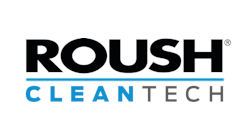Rural transit agency touts the benefits of propane paratransit buses
In rural Michigan, Charlevoix County Transit offers curb-to-curb transit via propane autogas vehicles, providing residents with access to the majestic beauty of Northern Michigan in a sustainable way. To meet the needs of the community, Charlevoix County Transit switched its fleet vehicles to propane autogas in 2016. Six years later, nearly 90 percent of its fleet runs on this alternative fuel, protecting natural resources while enjoying cost savings.
Time for change
Charlevoix County, located in the northern lower peninsula of Michigan, is 1,390-square miles, of which 974-square miles is water. Charlevoix County Transit is in Boyne City and its buses travel between 50 to 200 miles daily.
Due to its rural setting, there are few fueling options available to the agency, which is one of the many reasons Jill Drury, Charlevoix County Transit’s director, took an interest in alternative fuels. She discovered that propane autogas vehicles are known not only for their extended engine life and reduced maintenance costs, but also for their cleaner operating compared to gasoline and diesel models.
“Living and operating in an area that is conscious about the health of our lakes and land, I wanted to transition our fleet to an environmentally friendly fuel, as well as take advantage of the cost savings,” Drury said. “Propane autogas was the perfect solution for our agency.”
Following a tour of a company that has helped transit agencies make the switch to propane autogas, Drury began to transform Charlevoix County Transit’s fleet from gas and diesel to propane autogas, a domestic and renewable resource.
“While electric vehicles have a place in the transit industry, we don’t see them as a good fit for us due to the range limitations,” Drury said. “Our propane vehicles provide the range we need for our daily runs, and there’s no reason for us to switch to EV.”
Significant savings
To begin the transition, the team at Charlevoix County Transit chose to install an on-site propane fueling station to fuel its 13 Ford E-450 propane autogas cutaway buses. This eliminated the need for public fueling, making day-to-day operations easier and more affordable for the agency.
By 2021, Charlevoix County Transit saw a 50 percent reduction in per-gallon fuel costs. The current price of gasoline in its location is about $4.20 per gallon, compared to $2.05 for propane.
The agency also reduced its maintenance costs due to the fuel’s clean operation. According to a 2021 Land of Enchantment Clean Cities Coalition study, propane autogas is the most efficient mid-duty transit bus fuel option, based on cost and lifecycle. For example, filter packages cost 60 percent less on propane autogas vehicles, and oil changes are performed at 50 percent less miles. These savings added up quickly for the transit agency.
Easy on the environment
Propane autogas is a nontoxic, non-carcinogenic and non-corrosive fuel classified as a non-containment by the Environmental Protection Agency. Vehicles that run on propane emit fewer greenhouse gases, smog-producing hydrocarbons and particulate emissions than conventional fuels.
When considering the amount of fuel used by transit agencies, this can have a large impact on the service area; in fact, Drury reports that Charlevoix County Transit displaced roughly 36,000 gallons of gasoline last year.
“One of the biggest benefits of having alternative-fueled buses is the positive effect on our environment,” Drury said. “Our service area sits along Lake Michigan’s shoreline and has several large lakes in the heart of the county that drives the vacationing appeal of Charlevoix County. We are mindful of the environment and happy that by switching buses from diesel and gas to propane autogas, we are helping the air, land and waters where we live and vacation.”
Because of the many environmental benefits, there are several incentive programs to encourage the adoption of propane, including the 2021 infrastructure bill, government grants, VW settlement funding, market-based incentives (low-carbon fuel standards) and tax credits.
Domestic and renewable
Propane autogas is an alternative fuel made in the United States. More than 90 percent of the United States propane autogas supply is produced domestically, making it stable and readily available. Almost 75 percent of propane used in the U.S. comes from natural gas refining, and the remaining comes from petroleum during the refining process.
According to Drury, Charlevoix County Transit is saving money for every mile its propane paratransit buses travel in rural Michigan. “We’re reducing emissions and saving money along the way; it’s a win-win.”
Todd Mouw is executive vice president of sales and marketing of ROUSH CleanTech.

Todd Mouw | Executive Vice President of Sales and Marketing
Todd Mouw is executive vice president of sales and marketing for ROUSH CleanTech, an industry leader of alternative fuel vehicle technology. Mouw has served as president of the NTEA Green Truck Association.




